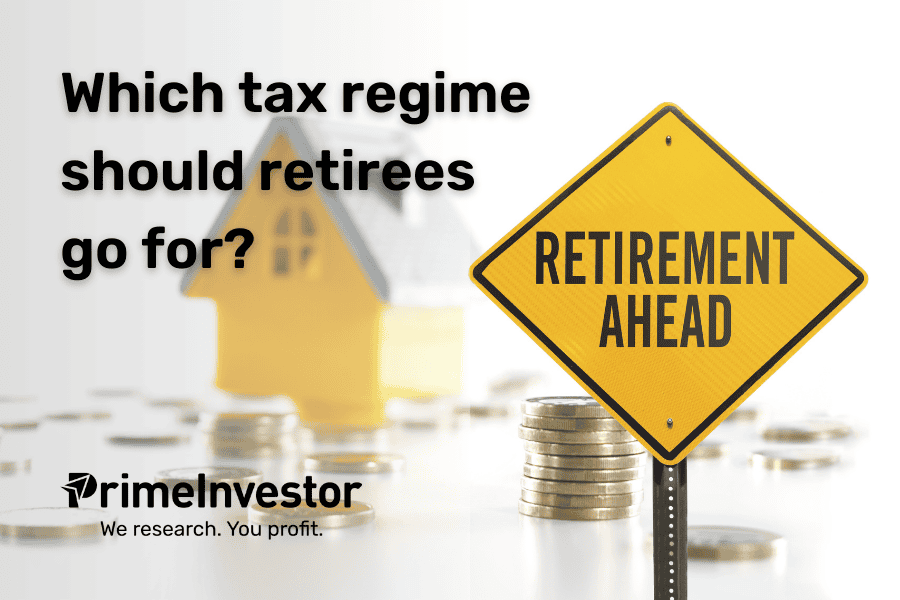Frequent changes in tax policies and rates are becoming a real pain point for Indian investors. The more the government claims to ‘simplify’ and ‘rationalise’ taxation, the more complicated it seems to become.

After the 2024 budget’s attempt at simplification, we continue to get a stream of queries from investors. Are ETFs ‘listed securities’ and eligible for the 12-month definition of long-term? Do you get indexation benefits on debt funds bought before April 1 2023? Why are debt fund gains taxable at slab rates while other assets get to be taxed at 12.5% on long term gains? The truth is that there has been no official clarification on these issues, leaving us to rely on our own interpretations.
While there may be no choice for folks in the earning phase of their career but to deal with these flip-flops, retirees can reduce the impact of such changes by shifting to the new tax regime. We offer five good reasons why retirees must shift to the new tax regime.
#1 Lower rates and wider slabs
After the relaxations in the latest Budget, tax slabs under the new tax regime look like this.
While the new regime offers no special rates for seniors, the old regime does. The tax slabs for senior and super-senior citizens under the old regime, are as following.
Despite the absence of concessions, the new regime is more beneficial for seniors on the following counts.
- For all individuals earning up to Rs 7 lakh per annum in income, the new tax regime is better than the old one, because you get an additional Rs 2 lakh of income rebated without having to park it in any specified vehicles. As retirees are likely to see a dip in income post-retirement, as they will be relying not on salary or profession, but income from investments and other sources, many of them may benefit from this rebate.
- For folks earnings more than Rs 7 lakh per annum and upto Rs 15 lakh, the new tax regime again offers wider slabs and better rates. Under the new regime, the 30% tax rate kicks in only beyond Rs 15 lakh of income, compared to Rs 10 lakh under the old regime. The new regime also offers a higher standard deduction of Rs 75,000 compared to Rs 50,000 under the old regime. Assuming a senior has no 80C, HRA, home loan etc and all his income is taxable, this is how the tax outgo compares in the new versus old regime, for FY25. This clearly tells us that irrespective of income levels, the new regime will mean a lower rate for 60 plus folk, compared to the old regime with its special rates for seniors.
#2 No need for tax saving investments
Many folks who are still in the earning phase don’t shift to the new tax regime because of legacy 80C investments, outstanding home loans on which they’re earning tax breaks or tax breaks on HRA/rental payments. Given ever-changing tax laws, we think making investment decisions on 8OC instruments or buying a home based wholly on tax breaks are fool-hardy.
This applies even more to retirees. Most of the popular 80C options such as PPF, small savings schemes, insurance, ULIPs etc (except for senior citizens savings scheme) are unsuitable for retirees and are meant for investors in the earning phase of their careers. 80C options also carry lock-in periods, which are undesirable for retirees who should prioritise liquidity. Hopefully, retirees would also not have any home loan commitment outstanding post-retirement. If they do, they should prepay it at the earliest.
Therefore, retirees can safely stop investing in 80C vehicles to move to the new tax regime. As HRA/rent/home loans are also unlikely to persist post-retirement, retirees can move to a cleaner tax structure (the new regime) that saves them a packet on taxes.
# 3 Future sops
Signals from the Finance Ministry are clear that all future tax concessions, whether in the form of lower rates or better slabs, will only be granted under the new tax regime. This has already been evident in the last two budgets. Only the new regime has got the benefit of higher standard deduction, higher income rebate, wider slabs and lower rates, while the features of the old regime have remained untouched. Therefore, if you don’t want to be stuck with the current rates of taxation forever, it would be best to make the switch to the new regime.
# 4 Passive income taxed at slab rates
If there’s one clear message from recent Budgets, it is that any form of income that you earn from your investments will eventually be taxed at your slab rate.
Over the last few years, all forms of passive income – dividends from shares and mutual funds, interest on deposits, bonds, small savings schemes and even buybacks from companies – have been swept into an umbrella definition of ‘income’ and are getting taxed at your slab rate. In fact, even the accumulated gains in debt funds are being treated as interest income, and taxed at slab rates. This makes it clear that, if at all there are any income-generating vehicles that still enjoy capital gains taxation, this loophole will get plugged in future.
Retirees are likely to rely more on passive income in the form of interest/dividends etc than capital gains, to meet their lifestyle needs. While you may need to manage your investments actively and churn your portfolio often, earning capital gains during your working years, you will likely rely more on a buy-and-hold strategy, with only occasional capital gains post-retirement. Now, capital gains enjoy a lower rate of taxation (at 20%/slab rates on short term and 12.5% on long term) than income in the form of interest, dividends etc. This is true if you are especially in the highest tax bracket.
Therefore, the only way to reduce the bite of taxes on a chunk gf your income post-retirement, is to switch to the new tax regime which taxes you at lower rates. The above table comparing tax outgo at different levels of income, shows that you can manage a substantially higher post-tax return on income-generating assets, simply by switching to the new tax regime.
#5 Less stress and easier tax filings
Many seniors spend sleepless nights worrying about their tax filings and whether the taxman will accept it at face value or decide to send a notice. Keeping up with the ruling regime’s flip-flops on tax policy and switching your investments accordingly from time to time can be both exhausting and thankless. As a retiree, there’s no reason why you should unnecessarily subject yourself to such anxiety. Moving to the new tax regime at least ensures that you don’t have to worry about the taxman disputing the exemptions that you claim. Your annual tax return filing exercise will become much easier and refunds quicker.




13 thoughts on “Which tax regime should retirees go for?”
Hello
For deep discount bond or 0% coupon bond, if held for more than 3 years, gains (difference between maturity value and purchase price) will be treated as interest or Capital gain tax. At what rate it will be axed ?Indexation benefit will be there or not? I have purchased this about 3 yrs back and matures in 2034.Am i protected by grandfathering concept?
If you hold till maturity it is taxed as interest. otherwise, it will be treated like any other listed bond (if listed), where CG is 15% for holding over 1 year. Vidya
My wife was bank employee, She was getting pension. After her demise, I am getting family pension. Can u tell wheather I am eligible to get standard deuction of Rs 75k or Rs 25k for FY 2024-25.
Pl. Reply
From my understanding you will get only the 25k deduction for family pension.
I didn’t fully understand the note by users here, but more or less thinking on the same lines..
When the fixed income (Debt MFs, FDs, Dividends, Bond interests) crosses 16.5 L (where the effective slab rate becomes 12.5%), for additional needs one can draw from Arbitrage funds to keep the effective tax rates below 15%. So one cannot completely ignore their FDs, Debt MFs (short term) for withdrawing. This tax leverage [for now] of Arbitrage kicks in only when the expenses crosses 16.5L during a FY.
I noticed a slight error in the text. The article is focused on retirees; but it mentions the standard deduction. This is available only for income under the head of salaries. Most retirees (unless they have government pension) won’t have income under this head and hence won’t have standard deduction.
Yes, but some retirees do earn pension. In the calculations where we compare tax incidence we haven’t assumed standard deduction is available.
On investing/ holding PPF during the retirement years.
Assumption:
Income from all sources are (excl. LTCG) greater than say 25 lakhs. Assuming you have completed the base 15 years already in your working life. i.e. you are in a 5 year extension. You have opted for the new tax regime (i.e. no 80C)
Thought:
PPF with 7.1% after tax return (and once a year withdrawal) can still be a good way to drawdown your PPF holding and using it as a steady state income.
Given that it already has a low interest rate, I don’t think GOI would lower the interest any further.
The interest rate on PPF is floating and pegged to gsec yields. So it can go down. Generally it is better to stick to more liquid options after retiring
Assumption:
The income from all sources is greater that 16.5 Lakhs (and assuming the new tax regime). At that point the effective tax rate crosses 12.5%.
Here’s a question/ thought:
If you have Deep Discount Listed Bonds. It could be a way to reduce your tax liability (holding beyond 1 Year). I wonder if it’s time for this to become popular?
It would be good if in the near future you cover about the Listed Deep Discount Bond in the market.
You are openly criticizing the govt’s tax policy, calling them flip flops. Is anyone listening? Why are we not able to create a huge community of people burdened by excess tax and ensure we have the numbers to change an election result?
I am a retired person and found this article to be excellent.
The biggest problem for retirees who are invested fully in mutual funds is irrespective of income and taxes in lower slabs now we have to pay stcg and ltcg taxes also. Hence I suggest and also shown in the article that income has to be covered up to up to 9 lakhs and the n additional income by booking long term capital gains only.
To facilitate this don’t you think financial products should advertise the taxation mode?. Even in your screener you may mention that.
Thank you! I think financial product cos are worried that if they advertise a tax loophole, it may get plugged! On a more serious note SWPs help you get the benefit of ltcg taxation on regular cash flows
On a more serious note SWPs help you get the benefit of ltcg taxation on regular cash flows
Comments are closed.